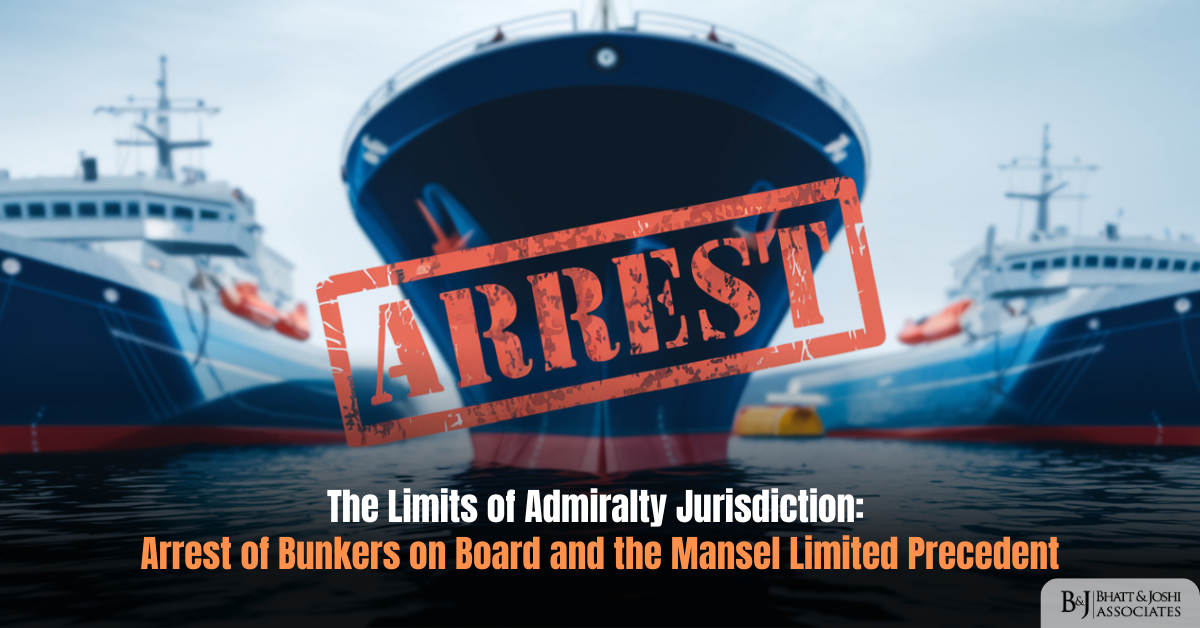A Case Note on the Arrest and Release of M.V. Alexandros P
Introduction
Admiralty jurisdiction, a specialized area of law governing maritime activities, grants courts the power to arrest vessels as security for maritime claims. This case note examines the recent judgment of the Gujarat High Court in the case of GML Chartering PTE. LTD v. M.V. Alexandros P, which highlights the limits of this jurisdiction and the importance of establishing a direct connection between the claim and the vessel being arrested in Admiralty Suit 39 of 2024 filed before the High Court of Gujarat.
Facts of the Case : GML Chartering PTE. LTD v. M.V. Alexandros P
The dispute originated from the non-payment of a bunker invoice for the M.V. Seamec Nidhi. Hilf Shipping, the time charterer of the M.V. Seamec Nidhi, sub-chartered the vessel to Ocean Connection. Ocean Connection then ordered bunkers from Oilmar but failed to pay the invoice, leading to Oilmar arresting the M.V. Seamec Nidhi in Egypt.
Prior to the arrest, the M.V. Seamec Nidhi was sold by its original owner, Seamec International, to new buyers. The new buyers were forced to pay Oilmar USD 320,000 to secure the vessel’s release. Consequently, they sought reimbursement from Seamec International for losses incurred due to the arrest, amounting to USD 565,568.23.
Seamec International, acting through its disponent owner, GML Chartering, then arrested the M.V. Alexandros P in India to secure their claim against Hilf Shipping for the losses they suffered. Here is a table of the parties and their relationships:
| Sr No. | Party | Relationship to M.V. Seamec Nidhi | Relationship to other Parties |
|---|---|---|---|
| 1 | Oilmar Shipping | Physical bunker supplier | Sold bunkers to Ocean Connection for use by the M.V. Seamec Nidhi, arrested the M.V. Seamec Nidhi in Egypt for unpaid bunker invoice. |
| 2 | Ocean Connection (OCPL) | Time charterer | Time chartered the M.V. Seamec Nidhi from Hilf Shipping, ordered and received bunkers from Oilmar but failed to pay the invoice, leading to the arrest of the vessel. |
| 3 | Hilf Shipping | Head time charterer | Time chartered the M.V. Seamec Nidhi from GML Chartering, sub-chartered the vessel to Ocean Connection, liable to GML Chartering for Ocean Connection’s unpaid bunker debt. |
| 4 | GML Chartering | Disponent owner for Seamec International | Time chartered the M.V. Seamec Nidhi from GML Chartering, sub-chartered the vessel to Ocean Connection, liable to GML Chartering for Ocean Connection’s unpaid bunker debt. |
| 5 | Seamec International | Original owner of the M.V. Seamec Nidhi | Sold the M.V. Seamec Nidhi to new buyers, claimed reimbursement from Hilf Shipping for losses incurred due to the arrest. |
| 6 | Buyers | Current owner of the M.V. Seamec Nidhi | Purchased the M.V. Seamec Nidhi from Seamec International, incurred losses due to the vessel’s arrest and sought reimbursement from Seamec International. |
| 7 | M.V. Seamec Nidhi | Vessel | The subject of the dispute, arrested in Egypt for unpaid bunker debts. |
| 8 | M.V. Alexandros P | Vessel | Arrested in India by GML Chartering to recover losses related to the arrest of the M.V. Seamec Nidhi. |
Key Relationships:
- Oilmar Shipping and Ocean Connection: A straightforward buyer-seller relationship, where Oilmar supplied bunkers to Ocean Connection. However, Ocean Connection’s failure to pay for the bunkers led to legal action by Oilmar.
- Ocean Connection, Hilf Shipping, and GML Chartering: These three parties are linked through a chain of time charter agreements. Hilf Shipping sub-chartered the vessel from GML Chartering, who in turn had time chartered it from the original owner. The non-payment by Ocean Connection created a chain of liability, ultimately impacting GML Chartering and Seamec International.
- Seamec International and Buyers: The sale of the vessel transferred ownership but the unpaid bunker debt from the previous time charter period led to complications for the new buyers. This resulted in a dispute between Seamec International and the buyers over responsibility for the losses incurred due to the arrest.
The Case Note
The provided case note, “The Limits of Admiralty Jurisdiction: Arrest of Bunkers on Board and the Mansel Limited Precedent,” clarifies the legal principles at play. It explains how the Gujarat High Court’s decision to release the M.V. Alexandros P was based on the principle, established in the Mansel Limited case, that the arrest of a vessel is only justified if there is a direct maritime claim against that vessel.
This case note, along with the table, provides a comprehensive overview of the complex web of relationships and legal issues arising from the unpaid bunker debt and subsequent arrest of the M.V. Seamec Nidhi.
The Gujarat High Court’s Decision in GML Chartering PTE. LTD v. M.V. Alexandros P
The Gujarat High Court, however, released the M.V. Alexandros P. The court relied on the precedent set in the case of Mansel Limited, a company incorporated under the laws of Bermuda V/s. Bunkers on Board the Ship M.V. Giovanna Iuliano and Ors. This case established that bunkers on board a vessel cannot be arrested independently unless there is a maritime claim against the ship itself.
The court found that the plaintiff’s claim was directed against Hilf Shipping and Ocean Connection for the unpaid bunkers on the M.V. Seamec Nidhi, not against the M.V. Alexandros P. The M.V. Alexandros P had no connection to the bunker debt, the charter agreement, or the events leading to the arrest of the M.V. Seamec Nidhi. Consequently, the court ruled that the arrest of the M.V. Alexandros P was unlawful and ordered its release.
No Maritime Claim Against the M.V. Alexandros P
The Gujarat High Court stated that there was no maritime claim against the M.V. Alexandros P itself, leading to the release of the vessel. This decision aligns with the principles outlined in the Admiralty (Jurisdiction and Settlement of Maritime Claims) Act, 2017, and the precedent set in the Mansel Limited case.
Relevant Provisions of the Admiralty Act:
- Section 4 (Maritime Claim): This section defines a maritime claim as a claim arising out of specific maritime activities, such as disputes related to vessel ownership, contracts for carriage of goods, salvage services, and maritime liens. Crucially, it doesn’t extend to claims arising from unrelated contracts or disputes involving other vessels.
- Section 5 (Arrest of Vessel in rem): This section allows the High Court to arrest a vessel as security against a maritime claim if the claim is directly related to the vessel, such as claims against the owner, demise charterer, or claims secured by a maritime lien on the vessel itself.
Application to the M.V. Alexandros P Case:
- GML Chartering’s Claim: The plaintiff, GML Chartering, sought to recover losses incurred due to the arrest of the M.V. Seamec Nidhi in Egypt. Their claim stemmed from Hilf Shipping’s (the time charterer) failure to pay for bunkers supplied to the M.V. Seamec Nidhi.
- No Direct Connection: The M.V. Alexandros P had no connection to the original bunker debt, the charter agreement, or the events leading to the arrest of the M.V. Seamec Nidhi in Egypt. It was merely an asset belonging to a party potentially liable for the plaintiff’s losses.
The Mansel Limited Precedent:
The Mansel Limited case reinforces the principle that the arrest of a vessel is only justifiable if there is a valid maritime claim against the vessel itself. The court in the M.V. Alexandros P case relied on this precedent to determine that arresting the M.V. Alexandros P to secure a claim against Hilf Shipping was unlawful.
Here are some paragraphs from Mansel Limited Vs. The Bunkers on Board the Ship M.V. Giovanna Iuliano and Ors () that are applicable to the case of the M.V. Alexandros P, especially in reference to bunkers:
- The judgement discusses the concept of a maritime claim in rem. This type of claim is brought against a specific property, typically a vessel, to enforce a maritime lien. Paragraph 82 of the Mansel Limited judgement states:
“Admiralty jurisdiction of the High Court is dependent on the presence of the foreign ship in Indian waters and founded on the arrest of the ship.”
This means the court’s authority in admiralty cases hinges on the physical presence of the vessel and the legal action of arresting it. The Mansel Limited judgment examines the historical development of admiralty jurisdiction in India. It clarifies that Indian High Courts inherited the admiralty jurisdiction of the English High Court under the Colonial Courts of Admiralty Act, 1891. Paragraph 13 of the Mansel Limited judgment clarifies:
“…the chartered High Courts in India are Colonial Courts of Admiralty under the Colonial Courts of Admiralty (India) Act of 1891…exercising the same jurisdiction as was vested in the High Court of Admiralty in England under the Admiralty Court Act, 1861.”
This historical context is crucial for understanding the basis of admiralty law in India. Paragraph 108 of the Mansel Limited judgment, citing The Beldis case, emphasizes that only the vessel directly involved in the alleged offense can be arrested to establish the court’s jurisdiction:
“It was only the allegedly offending vessel which could be made the ‘res’ so as to give the Admiralty Court jurisdiction in an action in rem where an action in rem was permissible. Jurisdiction in rem could not be created by the arrest or seizure of any other vessel, whether or not it was a sister vessel, nor of any other property. Admiralty procedure could not lawfully be used for the arrest or seizure of any property other than the allegedly offending vessel.”
This principle directly applies to the M.V. Alexandros P case, where the vessel arrested was not the one connected to the initial bunker debt. The Mansel Limited judgment highlights the distinction between the terms ‘ship’ and ‘property’ in admiralty law. While the court’s admiralty jurisdiction might extend to various types of property, the power to arrest in rem is generally confined to the specific ship involved in the maritime claim. This aligns with the rationale in The Beldis as quoted in Paragraph 108 of Mansel Limited. While the final order is awaited, it is clear that these paragraphs from the Mansel Limited judgement reinforce the Gujarat High Court’s decision to release the M.V. Alexandros P. The arrest was unlawful because the M.V. Alexandros P was not the vessel that incurred the bunker debt. It was merely an asset owned by a party potentially liable for the debt. The Mansel Limited precedent makes it clear that the arrest of a vessel in India under admiralty jurisdiction is permissible only when there is a valid maritime claim directly connected to the vessel itself.
The Gujarat High Court’s decision to release the M.V. Alexandros P aligns with the Admiralty Act and established case law. Arresting a vessel under the Admiralty jurisdiction is a powerful remedy intended to address claims directly related to that vessel. In this case, GML Chartering’s claim was against Hilf Shipping for a debt incurred on another vessel, the M.V. Seamec Nidhi. As such, there was no legal basis to arrest the M.V. Alexandros P.
Analysis
Admiralty Jurisdiction and Arrest of Vessels
The power to arrest a vessel in rem is a powerful remedy available to claimants under admiralty jurisdiction. The Mansel Limited case and the subsequent judgment in the M.V. Alexandros P case underscore the importance of ensuring that this remedy is not used arbitrarily. The arrest must be justified by a valid maritime claim that is directly connected to the vessel being arrested.
Maritime Claim Against the Vessel
In this case, the plaintiff’s claim did not arise from any action or omission of the M.V. Alexandros P or its owners. The claim stemmed from a contractual breach related to another vessel, the M.V. Seamec Nidhi. Therefore, there was no maritime lien or claim against the M.V. Alexandros P itself, making its arrest unlawful.
Protection of Innocent Parties
The Mansel Limited principle protects innocent shipowners and other parties from being unfairly impacted by disputes they are not involved in. Arresting a vessel can have significant financial consequences, causing delays and disrupting commercial operations. It is essential to prevent the arbitrary exercise of this power and ensure that it is used only when a genuine maritime claim exists against the vessel itself.
Conclusion
The Gujarat High Court’s decision in the M.V. Alexandros P case serves as a valuable reminder of the limitations of admiralty jurisdiction and the need to establish a direct connection between a maritime claim and the vessel being arrested. The judgment upholds the principles set forth in the Admiralty Act and the Mansel Limited precedent, protecting innocent parties from unlawful arrests and ensuring that the powerful remedy of arrest in rem is not misused.













